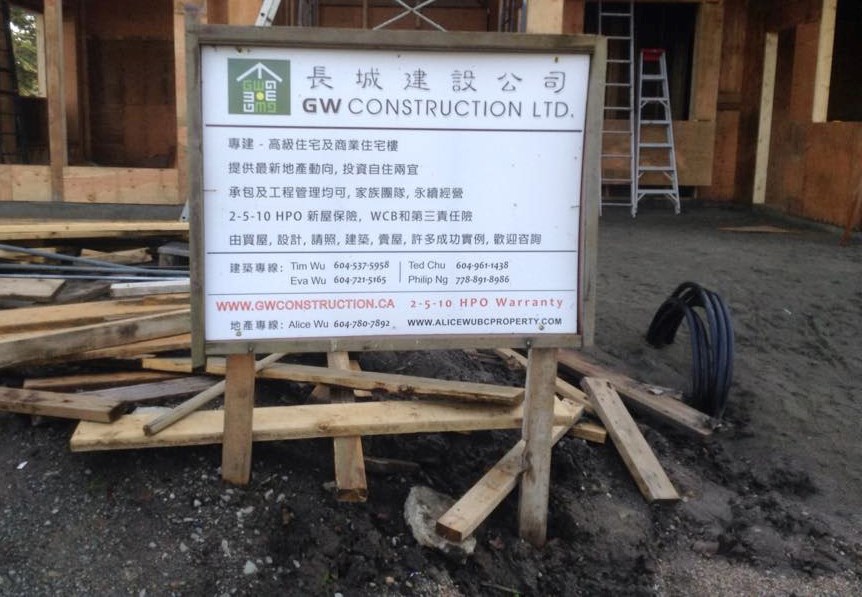Whether Richmond adopts an official-language sign bylaw will depend on the results of a newly launched public outreach campaign organized by the city itself.
On Monday the City of Richmond announced it is launching a “multi-pronged” public consultation process to open up dialogue on how foreign language-only signs have affected “community harmony” in the city.
The campaign begins publicly with a registered, community workshop on March 12 at the UBC Boathouse, but the broader campaign will involve a number of outreach efforts, according to a City of Richmond news release.
But Kerry Starchuk concerned the process may be biased.
Starchuk was one of the first Richmondites to go public with her concerns for how Chinese signs are symbolic of the lack of community cohesiveness that persists in Richmond.
She believes the workshop — that she notes is being held in a small, private environment — will follow a structured communications technique that relies on a handpicked panel.
The city stated it is working with the Richmond Intercultural Advisory Committee, Richmond Chamber of Commerce, BC Signs Association and individual sign companies, Canadian Race Relations Council, Laurier Institution, Richmond Chinese Community Society, Chinese Federation of Commerce of Canada and the Chinese Real Estate Professionals Association of BC to gather feedback on the issue.
"I was quite taken back as to whom they've invited. This isn't multiculturalism. This is all self-interest. I can't see how this is going to get any better," she said.
At issue is how some members of the Chinese business community have willfully or unknowingly ignored official Canadian languages by advertising with Chinese-only signs.
Starchuk says the concerns should extend beyond Chinese-only small business signs, which accounted for fewer than five per cent of new signs erected over the last three years, according to city data.
Also at issue, for Starchuk and many others, is how real estate developers have effectively ignored every language except Chinese, causing multi-generational Canadians and non-Chinese immigrants to feel excluded.
Furthermore, she said it’s hard to understand why public properties are now full of English-Chinese signs when there was no public discourse on the matter, let alone a referendum.
"There are other people that live here who are of other cultures. We have Punjab, Tagalog, and Spanish. So how come this (Chinese)?" she asked.
"We should ask, is this doing more harm than good? It's enabling. Canadians are enabling immigrants to fall further and further behind," said Starchuk.
The signs issue became much talked about during the 2014 municipal election campaign.
In October, city staff was directed by council to investigate the matter, undertake public consultation and “develop recommendations for possible future regulatory, education or other measures,” the release stated.
One of those measures could be a sign bylaw to mandate English or French on each sign, depending on the results of the consultation.
Some consider a bylaw a must while others consider it to be a last resort.
Still, others are wholly opposed to a bylaw.
In a pre-election questionnaire, councillors Linda McPhail and Bill McNulty, as well as Mayor Malcolm Brodie, said they opposed any sort of bylaw even if the community supported one (Coun. Derek Dang was non-responsive).
Starchuk said she is open to any possibility, so long as the community has true, open discourse on race relations.
A bylaw may pose constitutional issues, so by opposing one under any circumstance, the city could avoid a potential court challenge, which could come from the BC Civil Liberties Association.
The city stated it is now working with the University of British Columbia’s geography department to research how other communities are dealing with foreign-language signs.
The city claims it has already begun to consult with businesses to “encourage” inclusion of 50 per cent English content on signs.
This is being done through site inspections and educational information, including “friendly written notices” disseminated during business license renewals.
To register for the free workshop on March 12 at 6:30 p.m. at the UBC Boathouse at 7277 River Road in Richmond, email [email protected].
If you cannot attend but have an opinion, voice it at LetsTalkRichmond.ca



